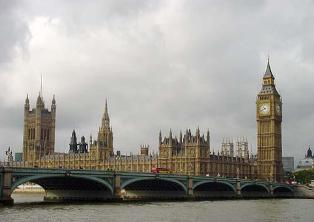 Hutton expanded at length on new energy legislation, accepting many interventions from other members. He rejected ideas that the possibility of new nuclear meant plans for onshore wind farms could be scrapped. Hutton said: "I'm afraid there are no easy choices... but making no choice at all is not one of them." He then reminded MPs of what is seen as the main driving force behind energy policy review: "The UK currently imports about 20% of its gas requirements, but that is projected to increase to well above 50% by 2020."
Hutton expanded at length on new energy legislation, accepting many interventions from other members. He rejected ideas that the possibility of new nuclear meant plans for onshore wind farms could be scrapped. Hutton said: "I'm afraid there are no easy choices... but making no choice at all is not one of them." He then reminded MPs of what is seen as the main driving force behind energy policy review: "The UK currently imports about 20% of its gas requirements, but that is projected to increase to well above 50% by 2020."The nuclear issue of most concern for MPs was assurance on the finance of radioactive waste management - and that it must not be subsidised by the state for new nuclear power plants. This comes in the context of an existing GBP73 billion ($143 billion) clean-up legacy from the UK's drive for atomic weapons and the world's first full-size nuclear power plants.
Any new nuclear power reactors in the country must be paid for by private enterprise under the new legislation that "will ensure that all operators have in place a robust financing arrangement, in the form of a funded decommissioning program, before operation of a power station commences."
"If there is to be a renaissance for nuclear power in this country - and I very much hope that there will be - it is important that we establish new ground rules that comply with the existing energy market principles on which this country operates."
"The bill will require every operator to have a fully costed technical plan for each new nuclear power station that sets out in detail how the station's nuclear waste will be dealt with safely, and how the station will eventually be decommissioned. The bill will also require all operators to have a financial plan that describes how they will provide the necessary funds to meet those costs. Both plans will form a funded decommissioning program that will be subject to approval by the secretary of state."
It will be a criminal offence to operate new nuclear power stations without having an approved program in place, while failure to comply with an existing program will also be an offence.
Hutton said that the government would ensure investor confidence by establishing a "fixed price for disposing of new nuclear waste. That will be based on expected costs, with a significant risk premium built in to safeguard the public purse. Further details of how the system will work will be available later this month." A consultation on radioactive waste finance plans is scheduled.
With regards to Scotland, Hutton conceded there could be no new nuclear power stations in that nation if the devolved administration - currently headed by the anti-nuclear Scottish National Party - did not grant planning permission. Hutton said: "I think that the Scottish Executive are making a huge mistake. As I have said before, I think that they are playing politics with the situation, and that is regrettable." The Hunterston B and Torness nuclear power plants currently provide around half of Scotland's electricity, but are due to close in 2016 and 2023 respectively. Scottish leaders hope to replace that capacity with renewables.






_15863.jpg)







